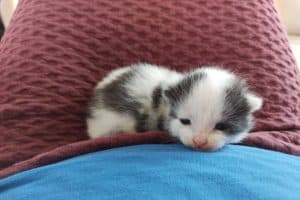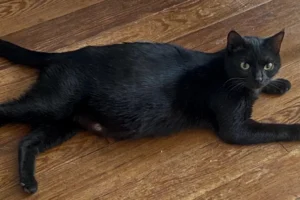Cats are known for their graceful movements, quick reflexes, and calm demeanor. However, if you notice your feline friend panting heavily, it may raise some concerns. But fret not, as we will delve into the reasons behind why a cat would pant heavily.
Cats can pant heavily due to stress, heat, exercise, respiratory issues, or underlying health conditions.
Stress
If your cat is panting heavily, stress could be a possible culprit. Cats can become stressed for various reasons, such as changes in their environment, loud noises, or even a visit to the vet. Keep an eye out for signs of stress in your feline friend, such as excessive grooming, hiding, or aggression. Providing a safe and comfortable space for your cat to retreat to can help alleviate stress and reduce heavy panting episodes. Additionally, incorporating interactive toys and regular play sessions can help keep your cat mentally stimulated and stress-free.
Helpful tip: Consider using pheromone diffusers or sprays designed to calm anxious cats in stressful situations. These products can be a valuable tool in helping your furry companion relax and breathe easier.
Heat
When the temperatures soar, your cat may start panting heavily as a way to cool down. Unlike dogs, cats are not as efficient at regulating their body temperature through panting, so excessive panting in cats can be a sign of overheating. To help your cat beat the heat, make sure they have access to plenty of fresh water and provide a cool, shaded area for them to relax in. You can also place a fan or air conditioning near your cat’s favorite spot to help them stay comfortable during hot weather.
Helpful tip: Freeze a water bottle, wrap it in a towel, and place it near your cat to create a makeshift cooling pad. Your cat will appreciate the extra relief from the heat.
Remember, if your cat is panting excessively and you are concerned about their health, always consult with your veterinarian for proper diagnosis and treatment.
Exercise
Excessive panting in cats after physical activity can be a sign that they are pushing themselves too hard. Just like humans, cats need to build up their stamina gradually to avoid overexertion. Ensure your feline friend is engaging in appropriate exercise for their fitness level. Avoid sudden intense workouts and encourage playtime that allows for breaks in between bouts of activity. Remember, rest is crucial to prevent heavy panting and keep your cat healthy and happy.
Respiratory Issues
Heavy panting in cats can also be a symptom of underlying respiratory issues. Common conditions like asthma and lung infections can restrict your cat’s breathing, leading to panting. If you notice persistent heavy panting, wheezing, or coughing in your cat, seek veterinary care promptly. Regular check-ups can help catch respiratory problems early and prevent complications down the road.
Insightful Tip: Providing a low-stress environment for your cat can help prevent respiratory issues that may contribute to heavy panting. Consider eliminating tobacco smoke and keeping air quality clean to promote healthy respiratory function in your feline companion.
Health Conditions
Cats may pant heavily due to underlying health conditions such as heart disease or respiratory issues. Heart disease can cause a cat to struggle with breathing, leading to panting. Lung problems such as asthma or pneumonia can also result in heavy panting. If your cat is panting excessively, it is crucial to seek veterinary care promptly.
Diagnosis of these health conditions may involve a physical examination, X-rays, blood tests, or other diagnostic procedures. Treatment will depend on the specific condition diagnosed and may include medications, lifestyle changes, or surgery. Regular veterinary check-ups can help detect any health issues early, improving the chances of successful treatment.
For more information on feline heart disease and respiratory problems, you can refer to the American Association of Feline Practitioners’ website: Feline Heart Disease and Respiratory Problems for additional resources and insights.
First Aid
If you notice your cat panting heavily, it’s essential to stay calm and assess the situation. Provide a comfortable environment for your cat with access to fresh air and water. Check for signs of distress such as coughing, wheezing, or blue gums. If your cat’s panting is severe or accompanied by other concerning symptoms, do not hesitate to seek immediate veterinary attention.
To help your cat cool down, you can gently wet their paws with cool water or use a damp cloth on their fur. Avoid immersing your cat in cold water, as this can cause shock. Monitor their breathing and behavior closely while waiting for veterinary assistance. Remember, quick action can make a difference in your cat’s health and well-being.
Prevention
If you’re wondering why your cat is panting heavily, there are a few things you can do to help prevent this from happening in the first place. One of the most important factors is ensuring your furry friend stays hydrated. Provide fresh water daily and consider adding wet food to their diet to increase moisture intake. Additionally, creating a stress-free environment can go a long way in preventing heavy panting in cats. Make sure they have a safe space to retreat to when feeling anxious or overwhelmed. Regular vet check-ups can also help catch any underlying health issues early on. By taking these preventative measures, you can help keep your cat happy and healthy.
Fun Facts
Did you know that cats use panting as a way to regulate their body temperature? Unlike dogs, cats are not natural panters, so if you notice your feline friend panting heavily, it could be a sign that they are overheated or experiencing stress. Another interesting tidbit is that some breeds of cats are more prone to panting than others, such as Persians and Himalayans, due to their brachycephalic (flat-faced) features. Next time you see your cat panting, remember these fun facts to better understand their behavior.
- Cats pant to regulate body temperature
- Some breeds are more prone to panting than others
- Panting in cats can signal overheating or stress.
For more information on cat panting, be sure to consult with your veterinarian. They can provide valuable insight into your cat’s specific needs and behaviors.
Alex, a passionate animal lover, has experience in training and understanding animal behavior. As a proud pet parent to two dogs and three cats, he founded AnimalReport.net to share insights from animal experts and expand his knowledge of the animal kingdom.









